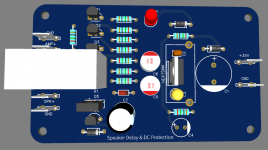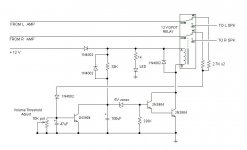Hi all,
I was looking for adequate protection for my new amplifier. I was considering relays with mosfets vs. classic relays. In the end I leaned towards a classic relay (Omron: G2R-1A-E-DC12V).
I'll ask for a review, thank you!
I was looking for adequate protection for my new amplifier. I was considering relays with mosfets vs. classic relays. In the end I leaned towards a classic relay (Omron: G2R-1A-E-DC12V).
I'll ask for a review, thank you!
Attachments
It is mono! It is advisable to use a fully sealed relay with silver based bifurcated contacts. Then you'll practically never will experience a bad relay. A few Euro extra will pay off. Many have bad experiences with relays but this often is because of choosing the wrong relay for the purpose.
BTW the cheap and reliable uPC1237 still is available and it is a handy IC for this. It can be used up to 60V supply voltage. It will save costs because the transistors and the regulator can be omitted. It is also for stereo amplifiers so 2 channels with just 1 IC. The latching/reset option is nice.
http://www.unisonic.com.tw/datasheet/UPC1237.pdf
BTW the cheap and reliable uPC1237 still is available and it is a handy IC for this. It can be used up to 60V supply voltage. It will save costs because the transistors and the regulator can be omitted. It is also for stereo amplifiers so 2 channels with just 1 IC. The latching/reset option is nice.
http://www.unisonic.com.tw/datasheet/UPC1237.pdf
Last edited:
Fully sealed as in hermetically closed/fluid proof, bifurcated silver contacts, preferably wolfram (tungsten) pre-contacts....... Never used them myself as I use Schrack/TE parts but Amplimo LR series seem to be OK for loudspeaker use. These have the wolfram pre-contacts able to switch 100A. As the contact is made the gold plated silver contacts bridge the wolfram contacts and therefor the gold plating is now OK and they won't pit as usual with gold or gold plated contacts.
I have replaced literally several tens of relays that were chosen wrongly for the purpose. Choose wisely.
I have replaced literally several tens of relays that were chosen wrongly for the purpose. Choose wisely.
Last edited:
I use these in my speaker switches... Not a failure in years so far.
https://www.mouser.ca/ProductDetail/Phoenix-Contact/2903676?qs=sGAEpiMZZMtdnzwU8tEEmIbqxbf17nJ6LGM%2B3kACsArkfYw0C1Ub2g==
I also use these... They work great in my input switch but they have the capacity for speakers.
https://lcsc.com/product-detail/Pow...-Electroacoustic-HF115F-012-2ZS4_C163534.html
https://www.mouser.ca/ProductDetail/Phoenix-Contact/2903676?qs=sGAEpiMZZMtdnzwU8tEEmIbqxbf17nJ6LGM%2B3kACsArkfYw0C1Ub2g==
I also use these... They work great in my input switch but they have the capacity for speakers.
https://lcsc.com/product-detail/Pow...-Electroacoustic-HF115F-012-2ZS4_C163534.html
Last edited:
The relay has to be able to break the contact at relatively high DC voltage and current levels. 100 W in 8 ohm is 40 V peak, so when there is a short to the supply and the loudspeaker has 6 ohm DC resistance, it would have to break something like 42 V, 7 A DC. An AC voltage is easier for a relay than DC, because sparks damp out in the zero crossings.
There is almost no DC with open contacts i.e. at the moment of power on. A few seconds after power on the DC offset stabilizes and then the contacts will close because of the desired delay to prevent power on plops (many here seem to like these phenomena and consider relays evil for some reason). When switching off and volume again lowered there will also be not much DC as the contacts will open before the DC dies out and discharges. There will be DC in a failure condition for which the relay is used as that is its second purpose besides the luxury of complete silence at power on/off. This will hopefully not occur many times in the lifetime of the amplifier.
Of course switching the amplifier on and off with volume down is recommended.
Of course switching the amplifier on and off with volume down is recommended.
Last edited:
This one might be overkill and costs 30$ but it's long life and rated for 35 amperes.
https://www.mouser.ca/ProductDetail...-Devices/AHES4291?qs=uLrlhPoGzAD9gjoKFCqMXg==
https://www.mouser.ca/ProductDetail...-Devices/AHES4291?qs=uLrlhPoGzAD9gjoKFCqMXg==
There will be DC in a failure condition for which the relay is used. This will hopefully not occur many times in the lifetime of the amplifier.
Indeed, and although it hopefully won't need to do it often, it has to be able to break the contact then.
Of course switching the amplifier on and off with volume down is recommended.
With cheaper relays, it actually helps to not turn the volume down completely. Sometimes you can even cure a rotten contact by switching on and off at a high volume a couple of times.
It will break the contact as that is its purpose and even if it would fail after having done its duty only once... replacing it won't break the bank as one has saved at least 1 woofer. It won't break down however after having done its duty just once.
No one sane will use cheap relays not suitable for the purpose although I see counter-logic more and more these days. It seems very off (certainly for a tech person) to have to switch on/off an amplifier at higher volume (error #1) because of using cheap relays (error #2) and thereby admitting failure in decision making (error #3). Error #4 is thinking the defective relay is "cured". Error #5 is trying to solve an error with an error. Because of this reasoning we probably have farting amplifiers without any speaker protection and MOSFET solutions.
No one sane will use cheap relays not suitable for the purpose although I see counter-logic more and more these days. It seems very off (certainly for a tech person) to have to switch on/off an amplifier at higher volume (error #1) because of using cheap relays (error #2) and thereby admitting failure in decision making (error #3). Error #4 is thinking the defective relay is "cured". Error #5 is trying to solve an error with an error. Because of this reasoning we probably have farting amplifiers without any speaker protection and MOSFET solutions.
Last edited:
I think the Amplimo relay fits the bill. It is a special relay designed specifically for amplifier output connect to speaker. It has two contact areas, one tungsten contact which can switch 100A (at 50V) to take the arc upon making and breaking contact for loudspeaker current. And a gold plated silver contact, giving negligible contact resistance even at small currents to bypass the tungsten contact.It is mono! It is advisable to use a fully sealed relay with silver based bifurcated contacts. Then you'll practically never will experience a bad relay. A few Euro extra will pay off. Many have bad experiences with relays but this often is because of choosing the wrong relay for the purpose.
https://www.toroidal-transformer.co...-relay/566/loudspeaker-relay-24v----lrz-.html
Again, please note that normally gold and gold plated are a no no for switching current. Only with wolfram pre-contacts this works out OK.
Regarding post 12: I'm not so sure it will break the contact unless you use a relay rated for the DC voltage and current that occur in a fault condition.
By the way, those rotten contacts occur in commercial amplifiers from Technics and Philips.
Regarding post 13: I thought the Amplimo relays were out of production, good to know that they are not!
By the way, those rotten contacts occur in commercial amplifiers from Technics and Philips.
Regarding post 13: I thought the Amplimo relays were out of production, good to know that they are not!
Last edited:
I know. In many if not nearly all old eighties/nineties stuff gold or gold plated contacts relays were used. Morons used to sand the contacts (removing the gold plating alltogether). Replacing for silver contact relays was a better solution. Till now I never experienced a failure of such a relay in this purpose contrary to the sanding that had the problems returning leading to people banging fists on equipment, switching stuff on/off n times and other clever actions.
In general a well chosen (crux!) 10 or 16A rated silver or silver based contact relay will have no issue with 40V peak/DC and 8 Ohm load. Contrary to farting amplifiers that will definitely blow speakers when they fail and complex semiconductor solutions the relay contacts will have very little effect on sound quality and they will save woofers.
Longevity, high sound quality, fail safe, risk reduction. Brrrr scary thinking 🙂
In general a well chosen (crux!) 10 or 16A rated silver or silver based contact relay will have no issue with 40V peak/DC and 8 Ohm load. Contrary to farting amplifiers that will definitely blow speakers when they fail and complex semiconductor solutions the relay contacts will have very little effect on sound quality and they will save woofers.
Longevity, high sound quality, fail safe, risk reduction. Brrrr scary thinking 🙂
Last edited:
That won't work as well as detecting the slightest DC and operate before any high current may occur. And ... no silent power on/off. Also better for the ears, the nerves and the woofers too.
Three good reasons to use good relays with a delay at power on, fast switch off at power off and DC detection. A fuse is wonderful in simplicity but its main character treat is to melt at short circuit.
Any questions?
Three good reasons to use good relays with a delay at power on, fast switch off at power off and DC detection. A fuse is wonderful in simplicity but its main character treat is to melt at short circuit.
Any questions?
Last edited:
Huhuh 🙄
The HF(Xiamen Hongfa Electroacoustic) HF115F/012-2ZS4 as suggested and used for input switching lacks a description of minimum switching current. One can conclude that this relay is not suitable for signal switching as signal switching is done with gold or gold-plated contacts. This relay is meant to switch Amperes of current (@ mains voltage) but it could be used to switch speakers. Since many like to build quality devices that don't break down it maybe is wise not to use it at all and simply choose parts from a reputable brand/series.
The HF(Xiamen Hongfa Electroacoustic) HF115F/012-2ZS4 as suggested and used for input switching lacks a description of minimum switching current. One can conclude that this relay is not suitable for signal switching as signal switching is done with gold or gold-plated contacts. This relay is meant to switch Amperes of current (@ mains voltage) but it could be used to switch speakers. Since many like to build quality devices that don't break down it maybe is wise not to use it at all and simply choose parts from a reputable brand/series.
Last edited:
- Home
- Amplifiers
- Solid State
- Simple protection with relay for amplifier up to 100W


